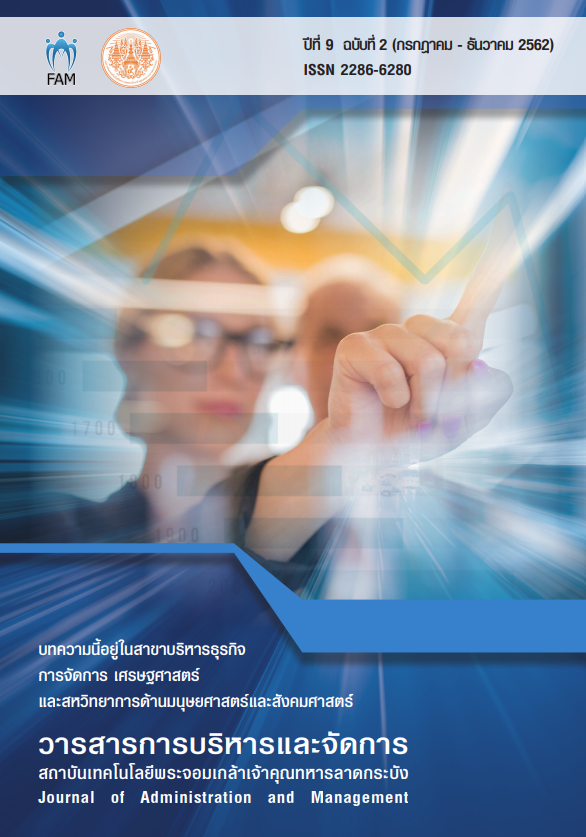ADMINISTRATIVE CAPABILITY, COMMUNITY PARTICIPATION AND STUDENTS’ ACEDEMIC PERFORMANCE OF SECONDARY SCHOOLS IN LAMPHUN PROVINCE, THAILAND: DEVELOPMENT PLAN
Main Article Content
Abstract
The success of any educational initiative in every country, province or district, depends largely on the administrative capability of education officials, community participation, and the students’ academic performance. The researcher analyzed the administrative capability, community participation, and student’s academic performance in the secondary schools, Lamphun Province, Thailand, in order to establish a basis for future Development Planning. Once the current levels (administrative capability, community participation and student performance) are assessed, the researcher will then use the results thereof, to inform future development planning proposals, in order to improve education in the province. Lamphun is the resident province of the researcher, with almost 20 years involvement in education in this area.
The research sample were made up of 31 school directors, 256 teachers, and 136 school board members. The researcher used quantitative method employing correlational design. The mean, frequency, percentage, standard deviation, correlation, ANOVA and multiple regression method analysis were used to analyze the data. It was revealed that levels of administrative capability in terms of executive leadership, personnel capability, financial capability, and physical plant capability were practiced. In addition, the extent of community participation in terms of planning, financial assistance, and technical assistance was practiced. Moreover, the academic performance of the secondary students was increasing in three consecutive years, it but did not meet the standard requirements, wherein the students were deficient in English subjects. Findings revealed that there was a significant relationship between administrative capability and executive leadership, but there was no significant relationship between administrative capability and personnel capability, financial capability, and physical plant. The executive leadership and financial capability were predictors in the level of administrative capability. The three dimensions are associated with the community of participation in three groups of respondents. Planning, financial assistance, and technical assistance were predictors of community participation. They encountered problems were on the lack of financial resources or management expertise, and not updated in facilities, and the delayed teachers incentives. It can be concluded that the administrative capability, community participation, and students’ academic performance were interrelated.
Article Details
Journal of KMITL Business School is available both online and in printed version.
**All articles or opinions presented in this issue of the Journal of KMITL Business School reflect the thoughts of their respective authors. This journal serves as an independent platform for a variety of viewpoints. Authors bear full responsibility for the content of their articles.**
**All articles published in this journal are copyrighted by KMITL Business School, King Mongkut's Institute of Technology Ladkrabang. The editorial team permits copying or using articles, but a reference to the journal is required.**
References
Bass, B., & Bass R. (2008). The Bass hand book of leadership. New York NY: The FreePress.
Dinham, J. (2014). Principle Leadership for outstanding education outcome. Journal of Educational Administration. 43(4). 338- 356. doi:10.1108/0957230510605405.
Goertz ME, Floden RE, O’Day J. (2015). Studies in education reform studies of education reform : Systemic Reform. From https://www2.ed.gov/PDFDocs/volume1.pdf.
Harris, A. (2005). Distributed leadership. In B. Davies (Ed), The essentials of school Leadership. (pp. 173-190).
London: Paul Chapman Lazo, M. (2013). The performance of elementary schools in the division of Ilocos Sur. Doctoral Dissertation, University of Northern Philippines. Miller, A. (2014). Just ask: strategies for building community partnerships. Retrieved From https://www.edutopia.org/blog/just-ask-building-community-partnershipsandrew- miller.
Mosala, G. & Mofolo, M. (2016). Effective use of budgeting as a tool towards financial management in schools in Lejweleputswa district. Retrieved from https://apsdpr.org/index.php/apsdpr/article/viewFile/121/120. Obrien, A. (2012). The importance of community involvement in schools. ). Retrieved fromhttps://www.edutopia.org/blog/community-parent-involvement-essentialanne-
Obrie OECD. (2013). PISA 2012 Results: What makes schools successful? resources, policies and practices. Volume IV. Retrieved from Organization for Economic Cooperation and Development
OECD website : https://www.oecd.org/pisa/keyfindings/pisa-2012-resultsvolume- IV.pdf.
Sergiovanni, T. (2006). Leadership basics for principals and their staff. The Educational Forum 60, p. 267-70.
Xaba L and Ngubane, D. (2010). Financial accountability at schools: challenges and implications. Retrieved from https://joe.ukzn.ac.za/Libraries/No_50_2010/ Financial_accountability_at_schools_challenges_and_implications.sflb.ashx.


